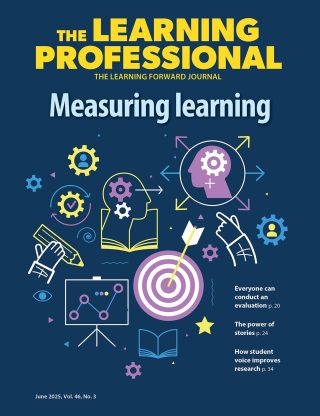FOCUS
Problem Solvers
MathLab's design brings professional learning into the classroom
By Sara Morales and Terri Sainz
February 2017
Vol. 38 No. 1
Read the remaining content with membership access. Join or log in below to continue.
Sed ut perspiciatis unde omnis iste natus error sit voluptatem accusantium doloremque laudantium, totam rem aperiam, eaque ipsa quae ab illo inventore veritatis et quasi architecto beatae vitae dicta sunt explicabo. Nemo enim ipsam voluptatem quia voluptas sit aspernatur aut odit aut fugit, sed quia consequuntur magni dolores eos qui ratione voluptatem sequi nesciunt. Neque porro quisquam est, qui dolorem ipsum quia dolor sit amet, consectetur, adipisci velit, sed quia non numquam eius modi tempora incidunt ut labore et dolore magnam aliquam quaerat voluptatem.
Sara Morales (smorales@nmsu.edu) and Terri Sainz (tsainz@nmsu.edu) are project researchers for Mathematically Connected Communities (MC2) at New Mexico State University.
References
Bradley, J., Munger, L., & Hord, S. (2015). Activities vs. outcomes: The difference makes all the difference. JSD, 36(5), 48-58.
DeMonte, J. (2013, July). High-quality professional development for teachers: Supporting teacher training to improve student learning. Washington, DC: Center for American Progress.
Dufour, R., Eaker, R., & Dufour, R. (2005). On common ground: The power of professional learning communities. Bloomington, IN: Solution Tree.
Guskey, T.R. (2000). Evaluating professional development. Thousand Oaks, CA: Corwin.
Hightower A., Delgado, R., Lloyd, S., Wittenstein, R., Sellers, K., & Swanson, C. (2011, December). Improving student learning by supporting quality teaching: Key issues, effective strategies. Bethesda, MD: Editorial Projects in Education.
Holloway, K. (2003, February/March). A measure of concern: Research-based program aids innovation by addressing teacher concerns. Tools for Schools, 1-6.
Learning Forward. (2011). Standards for Professional Learning. Oxford, OH: Author.
Mizell, H. (2010). Why professional development matters. Oxford, OH: Learning Forward.
New Mexico Public Education Department. (2012). New Mexico Common Core State Standards implementation plan. Available at https://newmexicocommoncore.org/pages/view/59/nmccss-implementation-plan/11.
Recent Issues
NAVIGATING NEW ROLES
April 2025
Whether you’re new to your role or supporting others who are new,...
LEARNING DESIGNS
February 2025
How we learn influences what we learn. This issue shares essential...
BUILDING BRIDGES
December 2024
Students benefit when educators bridge the continuum of professional...
CURRICULUM-BASED PROFESSIONAL LEARNING
October 2024
High-quality curriculum requires skilled educators to put it into...











